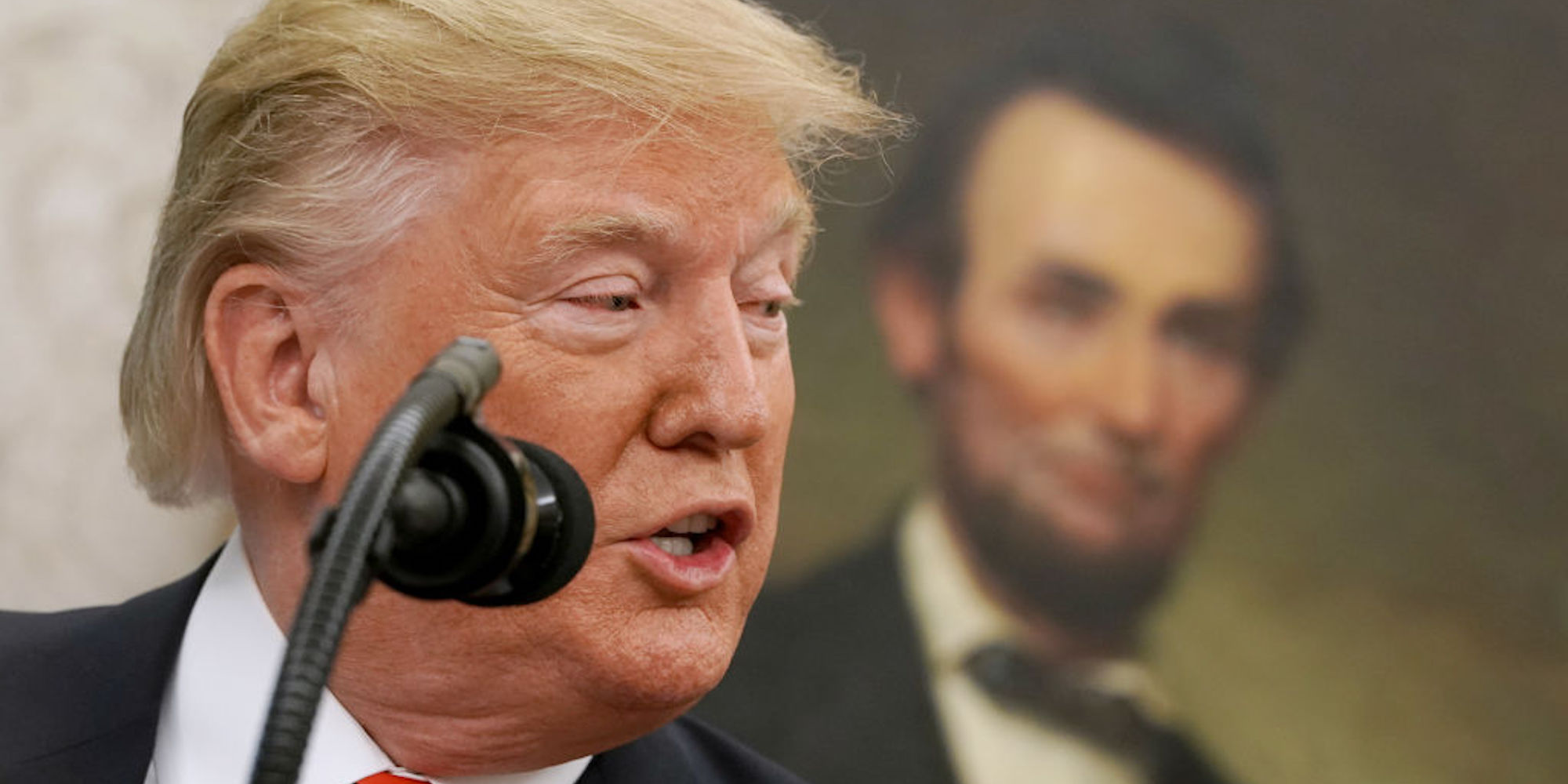- President Donald Trump told reporters in the Oval Office Monday that he is trying to establish the identity of the whistleblower who raised concerns about a call with the Ukrainian president.
- “We’re trying to find out about a whistleblower. When you have a whistleblower that reports things that were incorrect… The statement I made to the president of Ukraine, a good man, a nice man… was perfect,” said the president.
- The whistleblower’s attorney, Andrew Bakaj, tweeted that attempts to unmask whistleblowers are in violation of federal law.
- However, experts say there might be ways round the 1989 Whistleblower Protection Act, which was not designed for the possibility that the president may personally pursue an identity.
- Visit Business Insider’s homepage for more stories.
President Donald Trump on Monday told reporters that he is trying to discover the identity of a whistleblower who raised concerns about his July 25 phonecall with Ukraine’s president.
Trump told reporters that he is “trying to find out about a whistleblower” – even though a federal law exists which is designed to prevent such efforts.
Such an attempt would be a huge break with precedent, but, according to some experts, could ultimately succeed given that existing whistleblower law was not designed with the actions of a sitting president in mind.
At an event in the Oval Office on Monday, Trump said: “We’re trying to find out about a whistleblower. When you have a whistleblower that reports things that were incorrect… The statement I made to the president of Ukraine, a good man, a nice man… was perfect.
"It was perfect. But the whistleblower reported a totally different statement, like the statement was not even made."
When asked if he knows the identity of the whistleblower, President Trump says “we’re trying to find out” pic.twitter.com/kCMTdpeyjG
— CNN Politics (@CNNPolitics) September 30, 2019
Trump added that he was seeking to "drain the swamp" of the "tremendous corruption" among Democrats.
"The new president of Ukraine ran on the basis of no corruption... but there was a lot of corruption having to do with the 2016 election against us," he said. "We want to get to the bottom of it and it's very important that we do."
The whistleblower's attorney, Andrew Bakaj, tweeted that any attempt to unmask his client was in violation of federal law.
IC WB UPDATE: The Intel Community Whistleblower is entitled to anonymity. Law and policy support this and the individual is not to be retaliated against. Doing so is a violation of federal law.
— Andrew P. Bakaj 🇺🇸 🇺🇦 (@AndrewBakaj) September 30, 2019
Under the Whistleblower Protection Act of 1989, whistleblowers working for the government are shielded from having their identity exposed, and from retaliatory action being taken against them.
But Mandy Smithberger, director of the Center for Defense Information at the Project on Government Oversight, told USA Today that whistleblower protections contains loopholes which mean that a whistleblower not serving in a covert intelligence role might be lawfully exposed.
She said that whistleblowers could appeal being fired with the inspector general, but that the inspector general's decision to reinstate the person's employment is non-binding.
Also speaking to USA Today, David Iglesias, a former U.S. Attorney for New Mexico who is now an associate professor of politics and law at Wheaton College in Illinois, noted that the law is designed to deter government officials rather than the president himself.
He said: "Here's the problem: the law was written assuming that people in office below the president would be potentially violating whistleblower rights. This is uncharted waters in terms of the president potentially witness tampering or attempting to influence."
It is not clear on what grounds Trump said that the whistleblower's account of his call with Ukraine's president, Volodymyr Zelensky, does not line up with the facts. A memo of a call released by the White House aligns with the official's account of it.
The whistleblower's complaint has plunged Trump into crisis jut as he gears up his campaign for reelection in 2020.
According to the official and the White House transcript, Trump pressured Zelensky to launch an investigation into Joe Biden, the leading contender for the Democratic presidential nomination in 2020.
Last week, House Democrats launched an impeachment inquiry to establish if the president has abused his powers in seeking to enlist a foreign power to help take down a domestic rival.
In closed-doors remarks at the UN summit in New York last week, Trump described the whistleblower as treasonous and deserving of punishment.
"You know what we used to do in the old days when we were smart? Right? With spies and treason, right? We used to handle them a little differently than we do now," he told the US delegation, according to The Washington Post.

